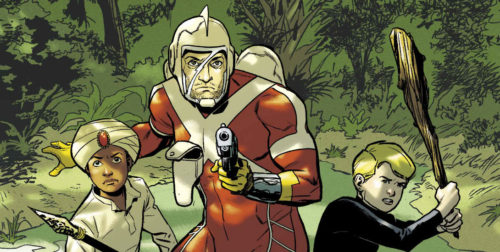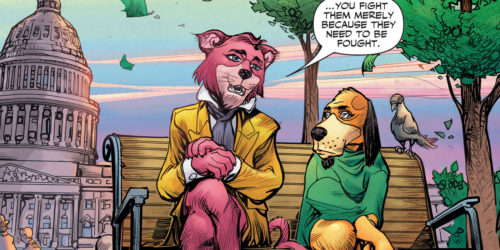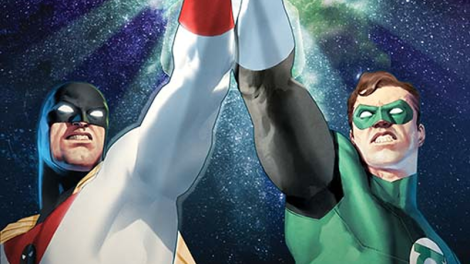
Yesterday I took a look at the first wave of the DC Comics reimagining of Hanna-Barbera’s properties, and coincidentally, it was also the day that Warner Brothers launched their Boomerang streaming service that gives fans access to much, but not all, original Hanna-Barbera programming. Like BritBox launching without including Doctor Who at first, Boomerang is missing some seminal content, such as The Flintstones (but it does have Wacky Races).
This month, DC celebrated the second year of Hanna-Barbera with four specials, mostly continuing with groundwork already laid, but using back-up stories to show that they’re going to do some wild rethinking, and in the vein of The Flintstones book, use funny cartoon characters as a lens into some social issues. Maybe unsurprisingly, the specials also started merging continuities, with at least one character getting firmly placed in the main DC Universe… and it’s not one you would expect.

After the events of Death of Hawkman, Adam Strange fell through a vortex and ended up in The Lost Valley, where Dino Boy and his neanderthal guardian Ug are essentially trapped. Enemy agents of F.E.A.R. see the stranger as an opportunity to get out of the Lost Valley, and the Quest crew calls in Birdman to help Adam Strange regain his memory and his way out. Adam Strange/Future Quest #1 doesn’t just fit into both universes’continuity; it’s also as fun as Future Quest should be. Not to lessen the impact of how tragic Adam Strange’s most recent adventure had been, but this book restores him to adventurer, with characters that would have fit right in with his original Mystery in Space exploits. Only earthbound.
It’s the back-up feature here that’s really rewriting things. With the back-up short Top Cat, Hanna-Barbera’s version of Sergeant Bilko gets dropped into the main DC Universe — specifically an alley in Gotham City. There he encounters Batman, with the promise of his wandering further throughout the city looking for his little pal Benny.

In his backstory, Top Cat comes from what appears to be a world of anthropomorphic cats, with no human Officer Dibble in sight. But throughout all these titles, there are hints of a world where funny animals and humans co-exist, somewhat dramatically.
That comes through in Suicide Squad / Banana Splits #1, which for its lead feature doesn’t really bother to explain how the Banana Splits could possibly exist in the regular DC Universe. Yet somehow they do, and get sent to prison before Amanda Waller recruits them to join Suicide Squad. It’s not quite as dark as it sounds, and writer Tony Bedard presents a group that isn’t just out of step musically, but in general with the times. They’re supposed to be a mess of fun, not a hot mess. But somehow Snork and Harley Quinn make a really good pairing that should appear again.

From the mind of Mark Russell of The Flintstones, it’s the take on Snagglepuss that puts a strangely honest lens on the character’s origins. We meet the fuchsia cougar in front of the House Unamerican Activities Committee, refusing to name names and becoming what lurked beneath the surface of his characterization all along — a mixture of Tennessee Williams and Oscar Wilde. Though in the cartoons he seemed to be more a failed actor, here he has evolved into a playwright, trapped in 1950s America and determined to write the truth for a public that doesn’t want to hear it. With no explanation, he coexists with humans quite comfortably, and if the promise of an ongoing series is true, it’s possible that Snagglepuss will be one of the most important books of 2017.

How rough the 1950s would have been on funny animals is further explored in “Ruff ‘n’ Reddy,” the back-up story in Green Lantern / Space Ghost #1. Conceived by Howard Chaykin, the dog and cat duo become a nightclub act after losing their former partners. This is vintage Chaykin, with one censored punchline (allegedly) so dirty for a mainstream DC book that Chaykin footnotes that he’ll have to tell it to you if you see him at a convention. It’s a companion piece to Snagglepuss, possibly, using Hanna-Barbera characters so early and so obscure that it’s hard to be upset at how far they are from their original incarnations.

Odd, then, that they back up a feature as straightforward as teaming Green Lantern and Space Ghost. With art by Ariel Olivetti, it’s less a companion to Future Quest as it is a sequel to Olivetti’s teaming with Joe Kelly on a [amazon text=Space Ghost mini-series&asin=1401267645] from several years back. The story is gorgeous, a little haunting, and also a little run-of-the-mill team-up. That’s not a bad thing; it’s just jarring set with Ruff ‘n’ Reddy.
A similar thing can be said about Booster Gold / The Flintstones #1. Though a decent lead story, it takes a backseat to the back-up reimagining of The Jetsons by Amanda Conner and Jimmy Palmiotti. Taking the space age family concept and giving it a dark, socially aware science fiction spin, there’s not one bit of this that’s funny; instead, it’s lightly philosophical. Delving into questions of consumerism and mortality, there’s a hint that it could lighten up now that the premise has been set. Still, Judy Jetson must be taken seriously.

The lead story isn’t meant to be; it tries to be satirical, but it also uses a take on Booster Gold that I admit I don’t like. He’s arrogant and barely competent, with no hint of it being an act. Sorry, once Geoff Johns figured out that Booster had to pretend to be a boob in order to be a greater hero, I can’t accept anything less. Granted, the New 52 kept giving us less.
But the Hanna-Barbera line is going to give us more. Still to come — a darker take on the Looney Tunes. I’m not sure that lightning can strike thrice, but I’ll let you know.

